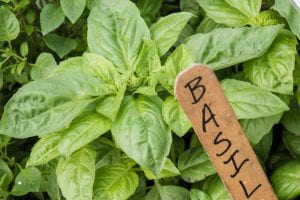By Andy Winfield
 This week we held a workshop for students about how you can get a little more from supermarket food and scraps; this provoked so much interest from staff and volunteers that I decided to write a blog detailing the workshop.
This week we held a workshop for students about how you can get a little more from supermarket food and scraps; this provoked so much interest from staff and volunteers that I decided to write a blog detailing the workshop.
The aim of a shop is to sell things, and preferably to come back and rebuy those things again and again; while we can’t avoid supermarkets to buy our food, we can win a few little victories. For example, take herb pots. Has anyone ever managed to keep a pot of basil for more than two weeks before it dies? I certainly haven’t, and the reason is that they are designed to die on our windowsills. Each stalk in the pot is a separate plant and once these plants begin to get bigger the small pots can’t possibly sustain them, so they starve. Instead, why not divide the pot and then pot up a few individual plants to grow on; this could give you up to a dozen basil plants that will last you ten times longer than two weeks; This goes for most of the herb pots and is also effective by dividing them into smaller clumps.
Supermarkets also supply us with tubers and corms to eat; we’ve all left a potato in the cupboard sprouting, a perfect opportunity to grow more potatoes. Place it on a shallow bed of compost in tub or a thick plastic sack, and as it grows keep covering the stem with compost until the growth reaches the top; let it continue growing to flowering which is when the potatoes will be forming under the compost. Do this in March and you’ll have potatoes by June/July. You can also grow garlic in autumn; plant a clove in a pot and the following summer you’ll have a whole bulb.
Some of the tropical buys in a supermarket double up as great house plants, such as ginger or turmeric. In spring, plant a supermarket bought ginger root on the top of a pot of compost, pressing it so the soil is halfway up the root and the other half exposed. This can grow to a lovely looking houseplant which will die back in winter and have grown a whole lot more root in the process for you to use in the kitchen. Turmeric is the same, except plant it deeper than the ginger; both are super foods, so growing your own tropical superfood can be deeply satisfying.
 Then there are the seeds; tomato, apple, squashes and chilli can all be sown at home. Chillies are particularly effective as an indoor crop without much space needed; sow them now for a late summer crop. Another seed worth trying out is citrus, either lemon or oranges; soak the seeds under water for several hours before sowing into pots. In time you’ll have your own little lemon tree.
Then there are the seeds; tomato, apple, squashes and chilli can all be sown at home. Chillies are particularly effective as an indoor crop without much space needed; sow them now for a late summer crop. Another seed worth trying out is citrus, either lemon or oranges; soak the seeds under water for several hours before sowing into pots. In time you’ll have your own little lemon tree.
Finally, salads. There are a number of shop bought salads that have been cut from a central growing point such as romaine lettuce or celery; if you place this end in shallow water they will begin to grow again. This will give you an extra flush of lettuce while the celery can be potted in compost and will grow a whole new set of stalks. Lettuce also makes an excellent pot plant grown from seed; so, it’s possible to pop to the garden centre and grow your own lettuce for a season.
Like I said, these are little victories, but nothing tastes better than something you have grown yourself; we’ve had a bit of fun testing these out at the Garden (particularly the lettuce and celery), so why not have go this year.



I have used mango and avocado stones to grow “house plants”. Squash seeds germinate in the compost heap – I planted them on last year and got loads of butternut. I also took the trouble to clean the seeds of a bought squash and then found out that it was an f1 hybrid and and wouldn’t grow true. Wouldn’t it also be the case for tomatoes, peppers, etc… bought from the shops?
Hello Pascale, yes it is true that there are a number of F1 hybrids in supermarkets that are grown for a high yield or specific feature. While they won’t grow true to the original it’s sometimes fun finding out what they produce. The worst that can happen is the tomatoes don’t taste as good or produce as much fruit.
Hope the mango and avocado plants are doing well!